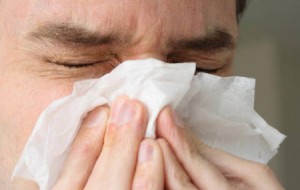Why does my nose run all the time if my doctor said I have no allergies?
- Posted on: May 22 2014

Rhinorrhea is the medical term used to describe a runny nose. There are some conditions that could make this mucus issue much worse. Probably, the most common condition that causes rhinorrhea is allergies, both seasonal and non-seasonal. Due to a cascade of chemical reactions that happen as a result of being exposed to the allergenic items, our noses release much more mucus, typically with a clear consistency. Together with congestion of the mucosal membranes, most people experience various degrees of runny nose. A discussion of nasal allergies was done elsewhere on this website.
Some patients with a runny nose have had various different allergy testings, and no such allergies were found. Therefore, we need to think about other reasons that patients may be suffering from chronic rhinorrhea.
Another common reason for rhinorrhea is vasomotor rhinitis. Sometimes as a result of eating foods or exercising or any other activity that would require certain hormonal changes in our body that would otherwise be used to make excess saliva or stimulate sweating, we may also have a side effects on the nasal passages. When these certain activities are undertaken, the mucus glands of the inside in the nose are activated, and the patient produces excessive amount of nasal secretions. This can be socially challenging if the patients experienced runny nose every time they have a meal with friends or family, or even on a date. Once the possibility of environmental allergies has been ruled out, most patients are treated with various medicines. Commonly, ipratropium bromide, often marketed as Atrovent ®, is used to suppress the mucosal glands from oversecreting. Some patients may also respond to over the counter antihistamines and decongestants.
A second non-allergic reason for runny nose is simply called non-allergic rhinitis. Certain patients’ symptoms profile fit the possibility of allergies, but when we performed allergy testing for them, no such environmental irritants are found. If we cannot find what the patient is allergic to, we labeled the condition as non-allergic rhinitis. Basically, all their symptoms mimic allergies, but we cannot offer them allergy shots or any directed treatments in trying to help them with their symptoms. Most patients with non-allergic rhinitis still respond to typical allergy treatments with nasal steroid sprays as well as antihistamines and decongestants.
For more thorough evaluation of your individual symptoms, your ear, nose, and throat specialist would be your first resource.
Tagged with: allergic rhinitis, allergies, atorovent, cnogestion, decongestant, ear nose throat, ENT, ipratropium bromide, Isaac Namdar, Isaac Namdar MD, nasal congestion, nasal obstruction, nasal steroid, New York, new york city, non-allergic rhinitis, nonallergic rhinitis, Nose, Otolaryngology, Otorhinolaryngology, rhinitis, rhinorrhea, runny nose, stuffy nose, vasomotor rhinitis
Posted in: Nose

